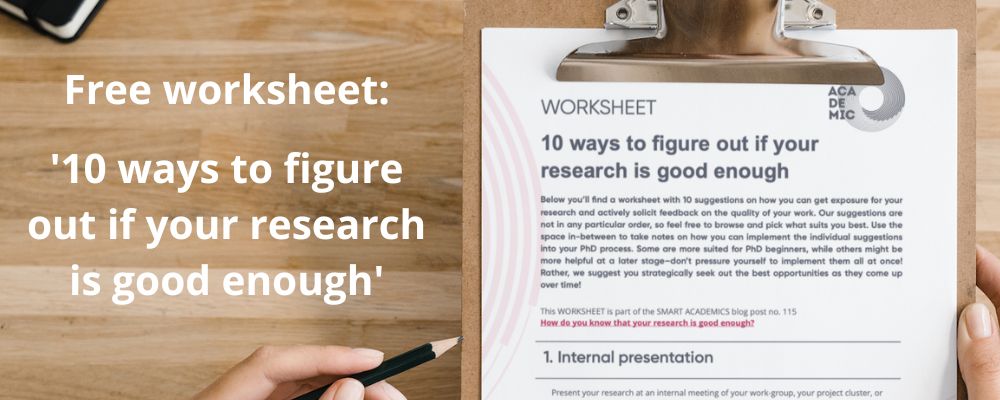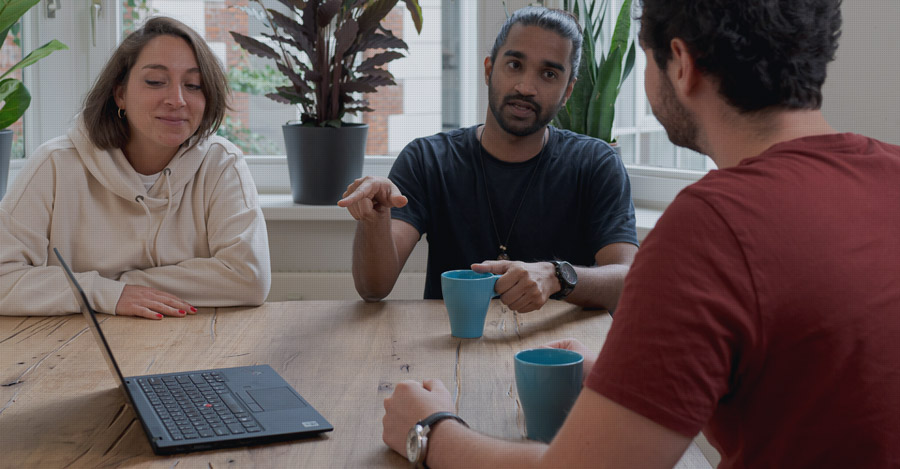Are you a PhD candidate and occasionally ask yourself whether what you are doing is good enough? Do you sometimes have doubts about the quality of your research? That’s nothing to be ashamed of. Questioning the standards of your research is part of a healthy self-reflection process which ultimately improves the quality of your work. In this blogpost, we’ll let you know what type of self-reflection is beneficial and in our free worksheet: “10 ways to figure out if your research is good enough,” we’ll suggest a broad range of activities to help get exposure and assess the quality of your work.
Are you a PhD candidate who occasionally asks yourself whether what you’re doing is good enough? Do you sometimes have doubts about the quality of your research? Do you wonder whether what you’ve proposed in your PhD is innovative enough?
Let us assure you that you’re not the only one. Worries regarding the quality or standards of your work are widespread among researchers. In fact, we got the inspiration to write this blogpost from a PhD candidate who joined our PhD Success Lab and had that very problem. He was afraid that what he set out to do in his PhD was not good enough, and that feeling bothered him a great deal.
Realising that you are not the only one may help already. It can help you to see the issue in a different light. Stop thinking that there must be something innately wrong with you. Instead, ask what in the research environment or in the way you interact with this environment is causing that response of uncertainty and doubt in you. Then you’ll be open to address the issue and react in a more appropriate way.
With this blogpost, we want to help you understand a bit more about the underlying mechanisms that may cause you to doubt your own research, and we’ll let you know how to distinguish healthy doubts from actual imposter syndrome. We suggest increased interaction and exposure to other scientists as the best strategy forward and in order to get you started, we have included a great free worksheet: “10 ways to figure out if your research is good enough.”

Fierce competition and high standards in research
Research is extremely competitive. A tiny fraction of PhD proposals gets funded, and the overwhelming majority of papers is rejected. Few of all submitted grant applications will ever receive funding and result in actual research projects. From among 80 to 100 job applicants, one will get the professorship in the end. There is fierce competition and selection at all stages and in all scientific arenas. You must acknowledge that it’s not always possible to be among the winners. Those who win may be the ones who failed at multiple attempts before.
Apart from that, there are incredibly knowledgeable, skilled, and intelligent people around you. It took them years of hard work to become that way and to develop the capabilities to undertake the research that they are carrying out now. You are at the beginning of an academic career. Stop comparing yourself to your professor, group leader or PI. You will be where they are, but in five, ten or fifteen years down the line!
Science in its pursuit of new knowledge is a learning environment in which everyone is supposed to learn and improve all the time. While that is fantastic and may be the very reason that you enjoy science so much, it can be a little scary at the same time. Being part of this learning environment means that everyone has to ask themselves if what they are doing is good enough, and what might be done to make it even better. That is part of what drives science forward.
It’s perfectly fine as a PhD candidate to ask yourself if what you do is good enough. Reflecting on the quality of your work is necessary. We’d even say striving for the highest possible standard in your work is a perfectly fine way to keep improving your skills and getting better.
Healthy self-reflection and knowledge production
Healthy self-reflection allows you to seek out and take-up what the people in your scientific discipline internationally are doing. You learn what they’re doing, how they work, which methods they apply, and what their quality standards are. This is the benchmark that you apply to your own work and it helps to discover any flaws or shortcomings in your project and iron these out. That type of critical self-reflection may also lead you to come up with an innovative idea, or incrementally invent something new that will prove even better than what you have seen from other scientists around you. You create new knowledge in that you use your insights to constructively push the frontiers in your own work. That is how scientific progress works (Tress et al. 2006).
Unhealthy, self-sabotaging behaviour and imposter syndrome
The type of work described above is clearly to be distinguished from a somewhat irrational and perpetual feeling of ‘I’m less good than other scientists,’ or ‘I’ll never be as good as they are,’ or ‘I’ll never get my project done,’ or ‘I’m always the one who’s criticised by the supervisor.’ That type of thinking, commonly known as imposter syndrome, induces a level of anxiety in yourself that blocks you from seeking neutral evidence about the quality of your work. It seeks confirmation that you are inferior to those around you (Abdelaal 2020).
You’re not using the findings of other scientists to improve; instead you’re seeking evidence for your belief in how bad the quality of your own work is. You are engaging in self-sabotaging behaviour. Needless to say that this way of thinking won’t do anything to advance science. It blocks you from neutrally accumulating information about what scientists produce internationally. Instead of using the knowledge production of others to develop your own advancement, you shut yourself off and retreat. This type of behaviour lowers the quality of your work and is detrimental to your health.
One of our previous students worked as part of a team that had just published a lead article in nature. Giving multiple interviews to news outlets and science magazines after the publication of the rather ground-breaking nature article, she was plagued by self-doubts on whether what she had achieved was good enough. She feared that someone from the international community would sooner or later find flaws in her work. She had an innate belief that it could not have been her who had made that breakthrough discovery–it wasn’t possible that she was that good a scientist. Not only could she not enjoy this massive success at the beginning of her career–she was actually sure there was something wrong with her.

The best way forward: exposure
You will never be able to figure out how good your work is if you are sitting in your home-office alone, or while standing in the lab by yourself, or by re-reading or editing your draft paper all alone.
The best way to figure out if your science is good enough is to expose your ideas, your work, and yourself to other scientists. This can be done in a myriad of different ways from small everyday interactions to deliberate presentations of your work via publications, posters, or talks at scientific events.
Exposure happens in the form of small personal encounters with a colleague who asks what you’re working on and provides casual feedback, or it happens through social media with you following the reaction of your peers to one of your posts. Exposure happens when you present your work to your supervisors, or during the annual PhD event of your institute.
Every single time you reveal aspects of your work, you’ll get feedback from your colleagues. It may not just come as explicit verbal statements, but also in the form of raised eyebrows, clapping hands, or nodding heads. You can use every signal you get to improve your own work.
Exposure is not a one-off event but a constant commitment. It’s often the multitude of feedback and criticism you receive that will help you develop your work in the right direction. It’s not about the opinion of one person towards your work, but about similar signals you receive from multiple sources. These should be taken seriously.
If you are on the right track with what you’re doing, there will be much more positive than negative feedback, and that’ll help you to develop confidence and ultimately become an independent scientist who dares to engage in constructive criticism of others and propose novel thoughts and ideas to the international community in your discipline. Once you,ve made that leap, you can ride the wave!
The sooner the better
The sooner you start exposing your work the better. At the beginning of a PhD, you have nothing to lose, so to speak. Even if you receive harsh criticism, an early proposal or project plan can still be fundamentally changed and improved. If that sort of criticism comes in the middle or towards the end of your PhD process, it will be much more difficult to take into account. Implementation of more fundamental changes at that stage may take a huge extra effort and mean additional work.
Likewise, it’s more important to have good exposure at the start of your research. At that stage, every point of criticism can help you to level-up the quality of your work. Every suggestion you receive can trigger new ideas that help you become more original and innovative. This way you can start out on the right path, and that’ll make your entire process a lot easier.
‘Getting out there’ right from the start of a PhD was the advice that Amandine Colson, recent PhD graduate, gave in her recent interview with the SMART ACADEMICS blog in our post no. 114 “PhD-journey with obstacles and happy end!”. She says “You’ll meet amazing people out there and you can build a network of people that you can work with and who support you, who may even become your friends.”
Actively seek exposure and take on every opportunity
Getting exposure for your work is the best way to ensure that your science is up to scratch. But you can’t just wait for it to happen. At every career stage, you should actively seek out feedback from those around you. That means you’ve got to keep an eye out for activities that are taking place around you and strategically think about how you can contribute. Make sure you claim your space in the international scientific community and make your voice heard!
We understand that you are probably wondering how you can amp up your exposure! We’ve compiled a great free worksheet: “10 ways to figure out if your research is good enough”, with inspiring suggestions that you can use to move your exposure from nought to sixty in no time.

Resources:
- Abdelaal, G. 2020: Coping with imposter syndrome in academia and research. Biochem (Lond) 22 June 2020; 42 (3): 62–64.
- Free worksheet: “10 ways to figure out if your research is good enough”
- SMART ACADEMICS blog no. 114: PhD-journey with obstacles and happy end!
- SMART ACADEMICS blog no. 110: How to create and make use of an online writing community
- SMART ACADEMICS blog no. 109: Four reasons why a writing buddy can help you!
- SMART ACADEMICS BLOG no. 44: What to present from your PhD study when you don’t have a lot to show yet?
- Tress, G., Tress B., Fry, G., Antrop M. 2006. Trends in landscape research and landscape planning: implications for PhD students. In: Tress, B., Tress G., Fry G., Opdam, P. [eds.]: From Landscape research to landscape planning. Aspects of Integration, Education and Application. Dordrecht: Springer .
More information:
Do you want to successfully complete your PhD? If so, please sign up to receive our free guides.
Photo by airfocus on unsplash
© 2022 Tress Academic
